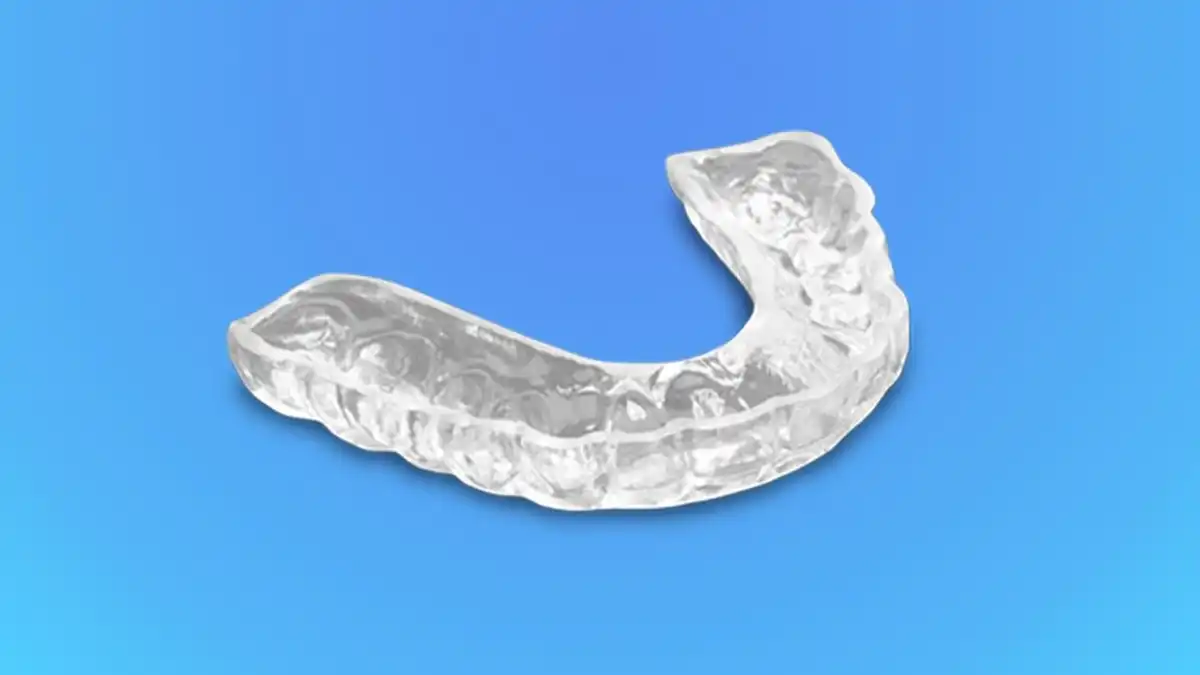How Much Does A Night Guard Cost?


Have you ever thought about getting a custom bite splint or mouth guard? There are lots of options out there, night guards being one of the most popular. How much is a night guard, though? The actual fee your dentist charges will depend on the type of design and materials used. They’re a smart investment that can actually save you hundreds—or even thousands—of dollars when it comes to the long-term health of your smile. How much do dental night guards cost from a store vs. at the dentist’s office? Usually much less, but they don’t work as well or feel as comfortable.
What Are Night Guards?
Night guards/bite splints/or bruxism mouth guards are protective appliances you wear over your teeth to protect them. A night guard is made for sleeping, where a bite splint or other type of mouth guard is usually reserved for daytime wear.
A professionally fitted night guard is generally crafted out of a highly durable layer of acrylic that prevents tooth-on-tooth wear. Usually you only need one (typically to go over the top teeth) instead of a set to fit both arches of teeth.
Most dental night guards cover the entire arch of teeth from one side to the other, instead of just a few teeth at a time. But there are types of splints out there that only go over your front teeth. With a night guard, you want one that’s secure enough that it will stay in place while you’re sleeping, won’t slip out of place (I mean who wants to choke on a nightguard in the middle of the night?!) and is durable enough that you’re not going to chew right through it.
Related: 5 Best Mouth Guards for Teeth Grinding
Reasons For Dental Night Guards?
When you want to know, “How much do night guards cost?”, the real question is, “How much money can night guards save me?” You see, wearing a protective appliance like a bite splint or night guard prevents pain and irreversible damage such as in situations related to:
- TMJ disorder
- Bruxism (chronic clenching and teeth grinding)
- Tooth-on-tooth/end-to-end enamel wear
- Migraines
- Broken dental work
- Chipped teeth
- Limited range of motion
- Stress and muscle tension
- Neck and shoulder pain
If you wear through your night guard, you’ll want to get a new one. That means your appliance is doing its job and protecting your teeth. Imagine the damage your teeth would do if you didn’t have something there to protect them!
Types Of Night Guards
When you’re comparing designs and how much do night guards cost, you have two options to pick from: Over-the-counter or a professional one that’s custom fitted by your dentist.
OTC Night Guards
Over-the-counter night guards come in a variety of shapes, sizes, and designs. They’re typically what we call a “stock guard” which means one-size-fits-most. Even if it’s a boil-and-bite design, it doesn’t provide the tight secure fit that a custom one will. But if you’re debating investing in a professional mouth guard, trying an OTC version might give you a good idea as to whether the idea of a night guard will be beneficial for your specific needs.
Custom-Made Mouth Guards
These are the night guards made by your dentist, using a mold of your teeth. They’re custom fitted to your specific teeth, providing both a comfortable and secure fit while you’re sleeping. Custom guards also tend to be more rigid and durable than what you’ll find in stores. Even though you’re paying a bit more for them, your investment is worth it; they’re just better for your mouth. Think of them like prevention-based insurance for your smile.
Direct To Consumer
Then there are the “direct to consumer” type of dental night guards where you take your own impression, ship it off somewhere, and they send a semi-custom device back in the mail. These mouth guards cost around $60 to $130 or more. Please always consult with your dentist first before using direct-to-consumer dental products.
Related: 5 Best Mouth Guards for Teeth Grinding
Cost Of Night Guards
How much is a night guard if you’re buying it at the store or through some type of a direct-to-consumer retailer? If you’re purchasing a one-size stock guard at the drugstore or online, you might be spending anywhere from $10 to $35. They’re fairly cheap. Just remember, you get what you pay for.
| Mouth Guard Type | Average Cost | Average Cost With Insurance |
|---|---|---|
| Boil & Bite/OTC | $20 to $250 | N/A |
| Direct-to-consumer | $60 to $140 | N/A |
| Dentist Custom-fit | $225 to $600 | $150 to $350 |
Then there are the “mail order” type of mouth guards where you take your own impression, ship it off somewhere, and they send a semi-custom device back in the mail. These mouth guards cost around $70 to $150 or more. Unfortunately, it can be really dangerous to get a semi-custom dental appliance without physically seeing your dentist. If something doesn’t fit just right, it could seriously damage your mouth and create unnecessary treatment costs to correct it.
IF YOU do choose an online dental night guard please bring it to your dentist to see if the fit is correct. Please always consult with your dentist first.
It’s fairly common to see a range of $300-800, depending on where you live and the specific type of night guard your dentist offers. Put into perspective, that’s less than half of a dental crown, if you break a tooth from grinding too much. Keep in mind that this cost is before you use any insurance or health fund benefits. And no matter the price of a custom mouth guard, it’s still cheaper than just a single dental crown to fix a broken tooth.
Are Night Guards Covered By Insurance?
Keep in mind that the amount your insurance covers will also need to be calculated into your expected deductible or any co-pays that your plan requires you to pay. So, if you have to meet a $200 deductible before your coverage kicks in, you’ll have to pay that first. Thankfully your dental office can help you do all the math and will work out a treatment plan that lists the fees that are expected. But if you already know you’re meeting your deductible based on other services and your insurance covers half of a night guard, you will probably be saving right at 50% on the price of a professional night guard. You cannot, however, use your dental insurance to cover the price of an over-the-counter mouth guard. Your flex/health savings account, yes, but not your insurance.
Finding The Root Cause
First, try to figure out why you’re clenching and grinding your teeth. Bruxism can be due to a whole host of issues, including:
- Anxiety
- TMJ disorder
- Sleep apnea
- Stress
- Misaligned teeth
- Medications you’re taking
- Caffeine or other supplements
If you’re able to pin down what’s contributing to your bruxism, you can take steps to change those lifestyle factors (at least in some cases.) It might be a dietary change, meditation, exercise, or something else that helps. When your body is relaxed, you’re less likely to take all that stress out on your teeth.
Another alternative to night guards is straightening your teeth. When our teeth are misaligned, we may instinctively try to keep biting them together to find a comfortable position. Investing in aligners or braces could help with irregular wear patterns and TMJ pain.
Dental Night Guard Alternatives
Since night guards are specifically meant to prevent teeth clenching, grinding, and jaw pain, there are some other options you might want to consider to manage those conditions.
1) Botox Injections
Yes, Botox helps with bruxism and joint pain. As a natural muscle relaxant, Botox can be injected into the muscles around your TMJ and jaw to provide extended relief for up to 3-6 months or more. Botox can be administered by your dentist if they happen to offer it at their practice (just ask!)
2) Braces
When teeth don’t fit together properly, they wear down prematurely. You can’t get worn enamel back. Aligning your teeth with braces or clear aligners can help to reduce the damage to your smile that’s caused by unnatural occlusion (biting patterns.)
3) Stress Relief
Stress is a leading factor when it comes to migraine headaches, muscle tension, and teeth clenching. Even though you can’t always get rid of stress, you can do things to alleviate the effects of it, such as massage, mindfulness, exercise, yoga, or medication.
4) Sleep Apnea Treatment
What To Expect From Night Guards
Wearing a night guard for the first time can take a little getting used to.
Adjusting To Sleeping With Night Guards
Do Night Guards Hurt At First?
How To Clean Your Night Guard
Just like dentures or an orthodontic retainer, you need to clean your night guard regularly. Otherwise, you can get an infection—such as thrush—or bad breath. Plan to rinse and brush your night guard as soon as you take it out of your mouth. Then store it in a closed case where it can air dry, keeping it in a cool and dry area. Make sure it’s out of the reach of any children or pets, who might be tempted to chew on it. Never clean your night guard with harsh abrasives or bleach, unless directed by your dentist. And always cool or lukewarm water, as hot water can warp your appliance.
If there’s too much buildup on your night guard, bring it to your next dental checkup to have your dentist or hygienist clean it off.
How Much Is A Night Guard?
The price of a quality nightguard is usually $200-300 minimum, but it’s worth every penny. Night guards can actually save you thousands of dollars by protecting your teeth against fractures, broken dental work, or time missed at work due to migraine headaches.
If you’re considering getting a night guard, the best thing to do is to work with your dentist. They’ll fit you with a custom design that’s both durable and comfortable. And even if you don’t have insurance to pay for 50% of it, they might offer a payment plan option!

Make your inbox smile!
Subscribe






